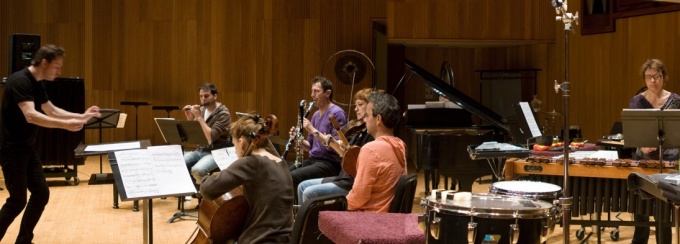Composition

Conductor Julien Leroy rehearsing Ensemble Court-Circuit members, flutist Jérémie Fèvre, clarinetist Pierre Dutrieu, violinist Alexandra Greffin-Klein, violist David Rose, violoncellist Ingrid Schoenlaub, and percussionist Eve Payeur at June in Buffalo 2014
For six decades, the UB Department of Music has enjoyed a unique reputation for dedication to the highest level of contemporary musical creation. Home to the Robert and Carol Morris Center for 21st-Century Music – a UB 2020 designated Center of Excellence – Composition flourishes today by providing a wide range of world-class musical and intellectual experiences.
Degree Options
Graduate: MA in Composition, PhD in Composition, Combined MA/PhD in Composition.
Undergraduate students interested in Composition are encouraged to pursue a BA in Music and adopt Composition as their advisement track.
Composition Highlights
Our program offers students the space to mature and evolve. In an atmosphere that encourages musical and technological experimentation, cross-disciplinary collaboration, and the development of authentic creative character, graduate composers at UB take advantage of a wide range of resources and opportunities:
- A faculty of internationally-recognized composers, also featuring regularly scheduled guest composers and world-class performers and ensembles offering distinct and complementary approaches to composition study – works by UB students are regularly performed by world-class ensembles in residence.
- Diverse course offerings in music theory, musicology and twentieth-century music, as well as study in select areas of music performance; opportunity to create an individualized course of study through petition, focused upon a student's unique interests
- A series of guest lectures and seminars by visiting composers, performers, ensembles and scholars; students’ works are discussed extensively in workshop and masterclass settings
- The Computer Music Studios are facilities which focus on the techniques and composition of pieces for musicians using interactive real-time digital signal processing systems
- A music library possessing an exceptionally fine collection of contemporary scores and recordings, including the Archive of the Center of the Creative and Performing Arts
We showcase student compositions in a variety of venues, made possible through the Birge-Cary Chair in Music, the Center for 21st Century Music, and private donors:
- The June in Buffalo festival and conference, a leading international forum for the presentation and exchange of contemporary music and musical ideas directed by David C. Felder from 1985 through the 2022 and from 2023 to present under artistic direction of Jonathan Golove.
- Several special series of recitals and concerts spotlighting a range of visiting contemporary music soloists and ensembles, featuring works by UB graduate students
- The Music Department's wide gamut of in-house performance resources, including student and faculty performers, student ensembles, and faculty ensembles-in-residence
Our diverse and dynamic graduate student body features composers, theorists, musicologists and performers from six continents who boast an extensive list of awards and accomplishments. The students and recent alumni of the Composition department have had works performed by some of the most well-known contemporary music specialists in the US and abroad; to name but a few:
- Ensemble InterContemporain
- The Arditti Quartet
- Ensemble Signal
- Ensemble Court-Circuit
- Ensemble LINEA
- Ensemble Mis-En
- JACK Quartet
- MIVOS Quartet
- ELISION Ensemble (Australia)
- Talujon Percussion Ensemble
- Talea
- Dal Niente
- Ensemble SurPlus
- The Nieuw Ensemble
- The New York New Music Ensemble
- The Meridian Arts Ensemble
- Nouvelle Ensemble Moderne
- Hinatsu Miroir (France)
- Court-Circuit (France)
- Les Percussions de Strasbourg (France)
Our Impact
Current students continue to receive highly regarded national and international awards in composition ranging from the Druckman Prize at Aspen, through Tanglewood Fellowships, Fulbrights, residency awards and many others. The Composition department is regularly represented at such prestigious courses, residencies, and festivals as:
- The International Gaudeamus Music Week
- Darmstadt Internationale Ferienkurse für neue Musik
- Nouvelle Ensemble Moderne FORUM
- Wittener Tage für Neue Kammermusik
- Fondation Royaumont Voix Nouvelles
- ISCM
- Aspen and Tanglewood Festivals
Our Faculty
The composition faculty at UB consists of internationally recognized composers and musicians dedicated to preparing students for successful careers in music. With a low student-teacher ratio, our department ensures that students receive highly personalized instruction and supervision, fostering an environment of excellence and individual growth.
Contact the Director of Undergraduate Studies or Director of Graduate Studies with any composition related inquiries.
All visiting composers, performers, ensembles and lecturers are sponsored by the Birge-Cary Chair in Music, the Office of the Dean, the UB College of Arts and Sciences, the Robert and Carol Morris Center for 21st Century Music, the Music Department General Fund and Music Lecture Series.

